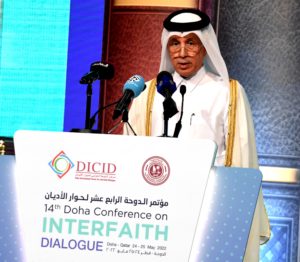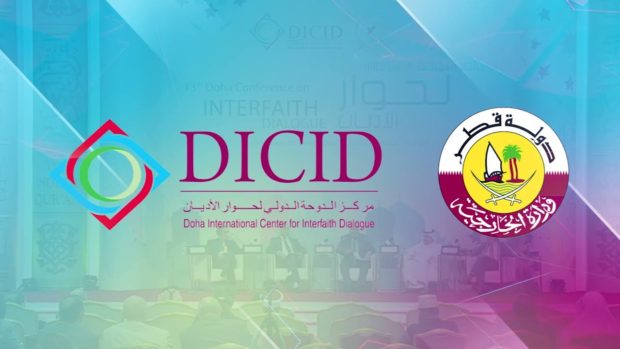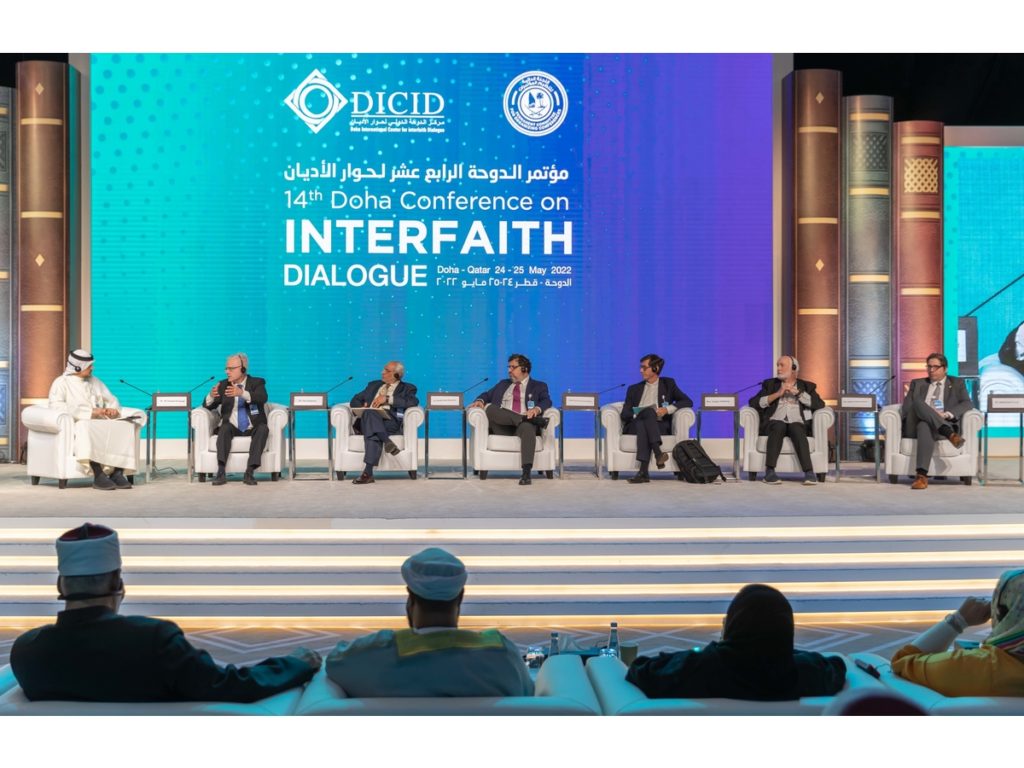Closing Remarks for the 14th Doha Interfaith Conference organized by the Doha International Center for Interfaith Dialogue, which took place in May 24 – 25, 2022.
In the name of Allah, the most merciful the most gracious
 Under the patronage of His Excellency, Sheikh Khalid bin Khalifa bin Abdulaziz Al Thani, Prime Minister and Minister of Interior; Doha International Center for Interfaith Dialogue conducted in the capital city of Qatar Doha on May 24 – 25, 2022 the 14th Doha Interfaith Conference 2022 activities under the title: “Religions and Hate Speech… Scriptures, and Practice”, which was attended by elites, great personalities, intellectuals, decision-makers, thinkers and researchers of the scholars of the three monotheistic religions (Islam, Christianity, and Judaism) from all over the world. The total number of participants from abroad was 263 contributors from 78 countries, in addition to the participants from the State of Qatar.
Under the patronage of His Excellency, Sheikh Khalid bin Khalifa bin Abdulaziz Al Thani, Prime Minister and Minister of Interior; Doha International Center for Interfaith Dialogue conducted in the capital city of Qatar Doha on May 24 – 25, 2022 the 14th Doha Interfaith Conference 2022 activities under the title: “Religions and Hate Speech… Scriptures, and Practice”, which was attended by elites, great personalities, intellectuals, decision-makers, thinkers and researchers of the scholars of the three monotheistic religions (Islam, Christianity, and Judaism) from all over the world. The total number of participants from abroad was 263 contributors from 78 countries, in addition to the participants from the State of Qatar.
At the beginning of the conference in the opening session H.E. Mr. Sultan bin Saad Al-Muraikhi, State Minister for Foreign Affairs, delivered an opening speech and welcomed the audience. He praised the title of the conference, appreciated the diversity of the selected topics, and commended the scientific conditions set up for accepting contributions. His Excellency stressed that combating hate speech is a serious issue that requires tremendous cooperation to achieve the goals of the interfaith dialogue bodies through relevant contributions at the conference, in-depth studies and analyses, and effective discussions among the leaders of the major world religions as well as researchers and intellectuals.
After the opening session, and during the two days of the conference, discussions were held in three plenary sessions, nine parallel sessions, and one closing session. In these sessions, participants gave their presentations on the respective topics. The conferences commented that many good papers were presented and that the presentations showed good practical activities and experiences.
Considering the paper presented and the discussion that took place, participants address some of the key points that were highlighted during the sessions. These concluding remarks include the findings and recommendations that the conference concluded; they are as follows:
First: The conference affirms that all religions call for respect and peace and that they condemn all forms of hate speech, extremism, racism, and discrimination based on religion, gender, or race.
Second: The conference emphasizes that confronting extraterrestrial thoughts and actions are a human duty and a noble work. The participants will work together to combat terrorism and extremism at the level of individuals, institutions, religious leaders, and political and civil societies in order to establish human ethics, spread peace and love, and build a civilized world.
Third: Condemnation of all forms and types of hate speech and rejection of behaviors and practices of extremist groups that call themselves religion, while the essence of religion is far removed from their deeds and actions.
Fourth: The need to use all legal means to develop an ethical strategy for the media on a professional basis. The goal is to limit the spread of hate speech on social media in the name of freedom of expression and to enforce compliance with the law on these platforms.
Fifth: The need to develop, adopt and submit a proposal to international organizations to develop curricula (especially for early childhood education) that teach the correct and proper religious principles and values that call for respect and coexistence and eradicate anything that inspires and incites hatred. And urge religious leaders to implement this proposal in their respective countries in accordance with the teachings of their religions.
Sixth: Ensure that there are no forms of double standard discourse among those involved in interfaith dialogue; there should be no internal discourse that supports, incites, and calls for hatred, while external discourse publicly condemns hatred in the presence of people.
Seventh: The conference Stresses that the phenomenon of Islamophobia and prejudice against Islam is not the method of the majority in the West but is practiced by minorities who ignore the true teachings of Islam and its essence, and are not familiar with the history of Islam and its civilization of tolerance, pluralism, and acceptance of others.
Eighth: The participants emphasis on moving from this phase of interfaith dialogue to a phase of true partnership and genuine interaction between the institutions of religions as well as civil societies; a single voice condemning hate speech regardless of its sources and originators.
Ninth: The conference calls to communicate with effective and influential interfaith dialogue bodies worldwide about the need to unite efforts in support of oppressed people suffering from hate speech and genocide, as is happening in Kashmir, the Rohingya minority, and the Uyghurs, and to openly reject all forms of hatred and oppression whenever and wherever it occurs, regardless of race or religion.

















No Comments